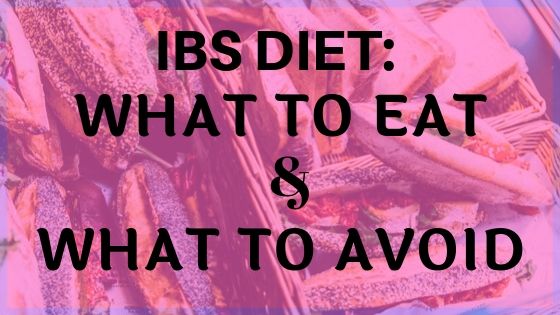
IBS fully known as Irritable Bowel Syndrome, is a medical term for a situation where an individual suffers frequent abdominal symptoms for example, diarrhea, clogging, or both. While specialists don’t have the foggiest idea what the main reason for the condition is, they do realize that it is a disorder that influences how the brain and gut interact.
A healthy eating regimen for the most part comprises of eating a wide assortment of nutritious diets with some restraint. In the event that you have irritable bowel syndrome or IBS (for short) you may notice your symptoms get activated after you eat certain meals or snacks. This article will discuss in detail possible IBS diets, what food triggers IBS and what food to avoid.
Foods To Avoid If You Are Suffering From IBS
Symptoms often vary between individuals, so there’s not one rundown of off-limit foods. Be that as it may, by keeping away from the absolute most basic triggers for IBS symptoms you may see greater normality, less cramps, and less bloating.
Some of the most common IBS triggers are discussed below;
Insoluble Fibre
Fibre adds solid mass to the eating regimen. Entire grains, vegetables, and natural products contain fiber. In spite of the fact that fibre resistance is distinctive for various individuals, insoluble fiber may cause or exacerbate diarrhea in certain individuals with IBS.
It is prudent to concentrate on dissolvable fiber. It is pertinent to note that insoluble fibre may diminish constipation, however it can likewise make you feel bloated.
Foods with soluble fibre include: grains, root vegetables, natural products, vegetables.
Gluten
Certain grains which contain gluten can cause different issues — to be specific: rye, wheat, and barley. Gluten is a sort of protein a few people are adversely affected by. This condition is known as Celiac sickness. It can cause side effects like those of diarrhea-predominant IBS.
Celiac ailment is an immune system issue that happens in certain people as a response to the ingestion of gluten. It can cause changes in the intestinal cells bringing about poor absorption of nutrients.
A few people have gluten intolerance without the resistant reaction or changes in the intestinal cells. This is known as non-celiac gluten affectability. Individuals with this condition may encounter a similar negative reactions and gastrointestinal side effects of gluten ingestion as those with celiac ailment.
Numerous individuals with IBS are additionally gluten narrow minded. A few examinations have demonstrated that gluten affectability might be associated with the advancement of IBS manifestations for certain individuals, and gluten diets may improve these symptoms . Nonetheless, everybody is unique. Finding how gluten influences IBS will be founded on the person.
Fortunately more sans gluten items go onto the market each day. On the off chance that you can’t manage without pizza, pasta, cakes, or treats, you can generally substitute them with sans gluten alternatives.
Fried Foods
Meat rolls and other fried meals are a staple in a typical diet. Control is the key with these type of foods. The high fat substance might be particularly hard on the framework for individuals with IBS. Frying food can really change the chemical composition of the food, making it progressively hard to digest. Think about baking your preferred food for a more advantageous option.
Caffeinated Drinks
A few people swear by their morning espresso for digestive consistency. Yet, similar to all caffeinated beverages, espresso affects the digestive organs that can cause diarrhea. Espresso, soft drinks, and caffeinated drinks that contain caffeine can be triggers for individuals with IBS. On the off chance that you need a jolt of energy or lift me-up, think about eating a little snack or taking a snappy walk.
Chocolate
Chocolate bars and chocolate sweet can trigger IBS as a result of their convergence of caffeine and their high sugar content. A few people experience constipation in the wake of eating chocolate. There are a few veggie options for chocolate lovers that IBS patients would find to be more tolerable.
Alcohol
Alcoholic drinks/beverages are a major trigger for individuals with IBS due to the manner in which the body digests alcohol. Beer is unsafe in the first place since it usually contains gluten, and wines and blended beverages and more often than not, contain sugar.
Alcohol can likewise result in dehydration, which can influence your liver capacity and assimilation. Restricting alcoholic drinks may help diminish symptoms identified with IBS. If you must have a beer, consider one without gluten brew or a beverage that is blended with plain seltzer and doesn’t have added sugar.
IBS Diet: What To Eat
Although medical intervention is significant in the treatment of IBS, there are sure diets known to lessen awkward IBS manifestations. The most common diets available to reduce uncomfortable symptoms are discussed below.
Gluten-free diet
Gluten is a protein found in grain items, for example, bread and pasta. The protein can harm the digestion tracts in individuals who are gluten-intolerant. A few people with an affectability or sensitivity to gluten additionally encounter IBS. In such cases, a without gluten diet may lessen symptoms.
Wipe out grain, rye, and wheat from your diet to check whether gastrointestinal issues persist. In case you’re a bread and pasta devotee, there’s still hope. You can discover sans gluten renditions of your preferred items in health food stores and numerous supermarkets.
Low FODMAP diet
FODMAPs are starches that are hard for the digestive organs to process. Since these carbs maneuver more water into the system, individuals with IBS may encounter more gas, swelling, and diarrhea subsequent to eating these foods.
The abbreviation means “fermentable oligosaccharides, disaccharides, monosaccharides, And polyols”. Temporarily reducing your ingestion of high FODMAP foods for six weeks to about two months may improve IBS symptoms.
It’s pertinent to note of that not all starches are FODMAPs. For the best result, you need to expel the correct sorts of foods. Starchy foods to keep away from include: lactose (milk, dessert, cheddar, yogurt),certain natural products (peaches, watermelon, pears, mangoes, apples, plums, nectarines), vegetables, high-fructose corn syrup, sugars, wheat-based bread, grains, and pasta, cashews and pistachios, certain vegetables (artichoke, asparagus, broccoli, onions, brussels grows, cauliflower, mushrooms)
Remember that while this diet dispenses with certain organic products, nuts, vegetables, and dairy, it doesn’t wipe out all food from these classes. If you, however, want to drink milk, pick sans lactose milk or different choices, for example, rice or soy milk.
To maintain strategic distance from these meals, talk with a dietician before starting this eating regimen.
Low Fat Diet
Constant ingestion of high-fat foods is a known cause of different medical problems, for example, stoutness. Be that as it may, it tends to be particularly hard on those with IBS by aggravating symptoms.
High-fat foods are commonly low in fibre, which can be tricky for BIS-related constipation. According to clinical investigations, fatty foods are especially terrible for individuals with mixed IBS, which is described by a mix of constipation and diarrhea. Setting out on a low-fat diet is useful for your heart and may improve awkward bowel symptoms.
Rather than eating fricasseed foods and animal fats, center around lean meats, natural products, vegetables, grains and low-fat dairy items.

